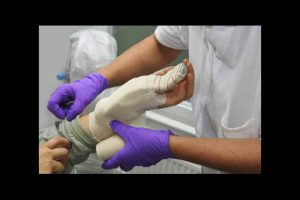“… Morning has broken like the first morning, Black bird has spoken like the first bird. … Praise with elation, praise every morning, God’s re-creation of the new day. …”
Although this old hymn’s lyrics (by Eleanor Farjeon) may print the word recreation without the hyphen, I placed it here to emphasize not only how the word is pronounced in the song but also how we need to consider what recreation means in our lives.
We use words without thought of their radical meaning — in the sense that the word radical is derived from radix, or root. Consider then the roots of re-creation. The word is derived from the Latin also: re meaning “again” and creare meaning “to bring forth” or “to beget.” So our recreation is our own re-creation — a renewal, a way to have new life.
Re-creation can take on many forms. Children are naturals at play and recreation, yet adults may sometimes interfere with their developmental process. For example, when we remove school recesses, or consider art and music as superfluous to the academic curriculum, we deny the need for re-creation. Re-creation gives balance to both children’s studies and adults’ work. What research finds is that recreation actually enhances both academic and job performance.
This is not about being of the leisure class or its opposite, an incessant laborer. Re-creation is about finding balance in life between work and the play that helps us re-create and renew.
Now that it is August, many of us are almost at the end of re-creation vacation times and headed toward Labor Day. Ironically, Labor Day, in a way marks the need for re-creation, not the end of it.
Labor Day was most likely established in 1882 by Matthew Maguire, a machinist and secretary of the Central Labor Union. Following the deaths of workers at the hands of United States marshals and the military during the Pullman strike, the United States Congress legislated Labor Day as a national holiday. This was to be a day of “recreation and amusement” for workers and their families. Now, many employees who work in retail, rather than celebrating, are working themselves — for all the “Labor Day Sales.”
Perhaps this is just one indication of how Americans work longer hours and have less time for recreation than workers in just about every other developed nation. Reporting in a Harvard University policy brief, Rebecca Ray and John Schmitt note, “average annual working hours are substantially shorter in European countries and elsewhere … than they are in the United States. … [U.S.] workers are less likely to receive paid annual leave and paid public holidays … those … that do receive paid time off generally receive far less than their counterparts in comparable economies.”
Well, despite how we may have less re-creation time, we can savor re-creation moments each day wherever we find them. The re-creation of the new day may be listening to hear the blackbird speak.
* Kayta Curzie Gajdos holds a doctorate in counseling psychology and is in private practice in Chadds Ford, Pennsylvania. She welcomes comments at MindMatters@DrGajdos.com or 610-388-2888. Past columns are posted to www.drgajdos.com.
About Kayta Gajdos
Dr. Kathleen Curzie Gajdos ("Kayta") is a licensed psychologist (Pennsylvania and Delaware) who has worked with individuals, couples, and families with a spectrum of problems. She has experience and training in the fields of alcohol and drug addictions, hypnosis, family therapy, Jungian theory, Gestalt therapy, EMDR, and bereavement. Dr. Gajdos developed a private practice in the Pittsburgh area, and was affiliated with the Family Therapy Institute of Western Psychiatric Institute and Clinic, having written numerous articles for the Family Therapy Newsletter there. She has published in the American Psychological Association Bulletin, the Family Psychologist, and in the Swedenborgian publications, Chrysalis and The Messenger. Dr. Gajdos has taught at the college level, most recently for West Chester University and Wilmington College, and has served as field faculty for Vermont College of Norwich University the Union Institute's Center for Distance Learning, Cincinnati, Ohio. She has also served as consulting psychologist to the Irene Stacy Community MH/MR Center in Western Pennsylvania where she supervised psychologists in training. Currently active in disaster relief, Dr. Gajdos serves with the American Red Cross and participated in Hurricane Katrina relief efforts as a member of teams from the Department of Health and Human Services' Substance Abuse and Mental Health Services Administration.Now living in Chadds Ford, in the Brandywine Valley of eastern Pennsylvania, Dr. Gajdos combines her private practice working with individuals, couples and families, with leading workshops on such topics as grief and healing, the impact of multigenerational grief and trauma shame, the shadow and self, Women Who Run with the Wolves, motherless daughters, and mediation and relaxation. Each year at Temenos Retreat Center in West Chester, PA she leads a griefs of birthing ritual for those who have suffered losses of procreation (abortions, miscarriages, infertility, etc.); she also holds yearly A Day of Re-Collection at Temenos.Dr. Gajdos holds Master's degrees in both philosophy and clinical psychology and received her Ph.D. in counseling at the University of Pittsburgh. Among her professional affiliations, she includes having been a founding member and board member of the C.G. Jung Educational Center of Pittsburgh, as well as being listed in Who's Who of American Women. Currently, she is a member of the American Psychological Association, The Pennsylvania Psychological Association, the Delaware Psychological Association, the American Family Therapy Academy, The Association for Death Education and Counseling, and the Delaware County Mental Health and Mental Retardation Board. Woven into her professional career are Dr. Gajdos' pursuits of dancing, singing, and writing poetry.
- Web |
- More Posts(250)


Comments